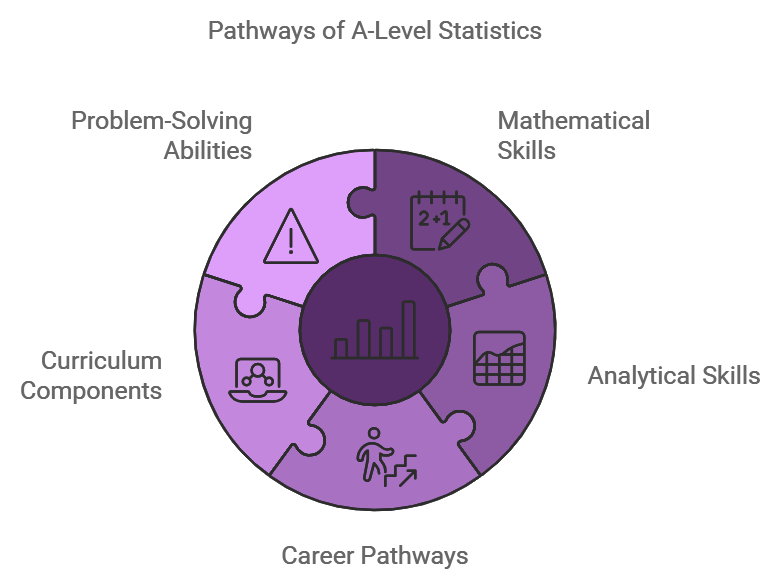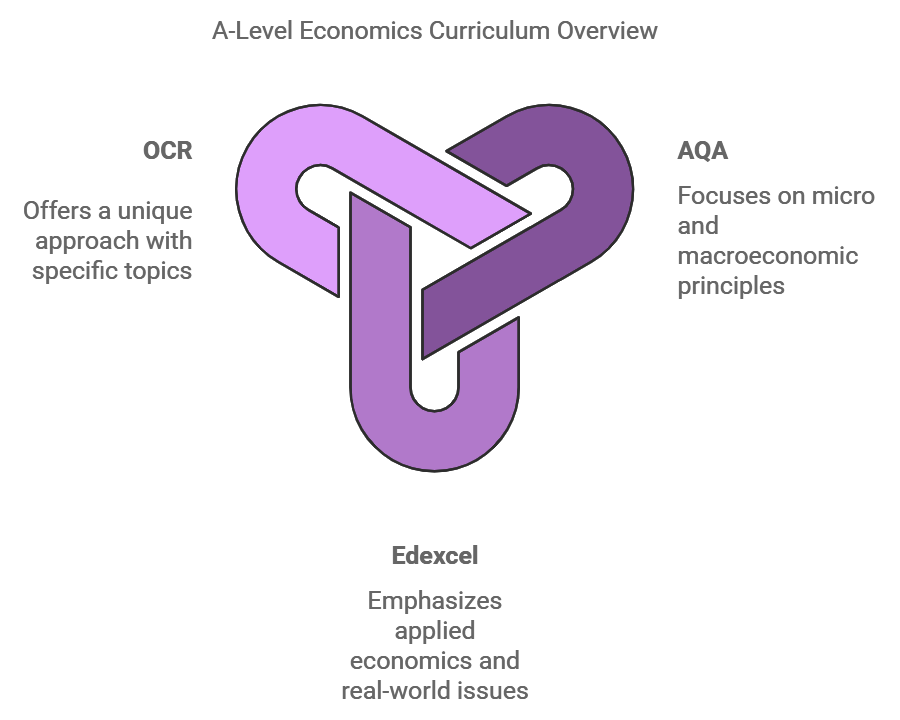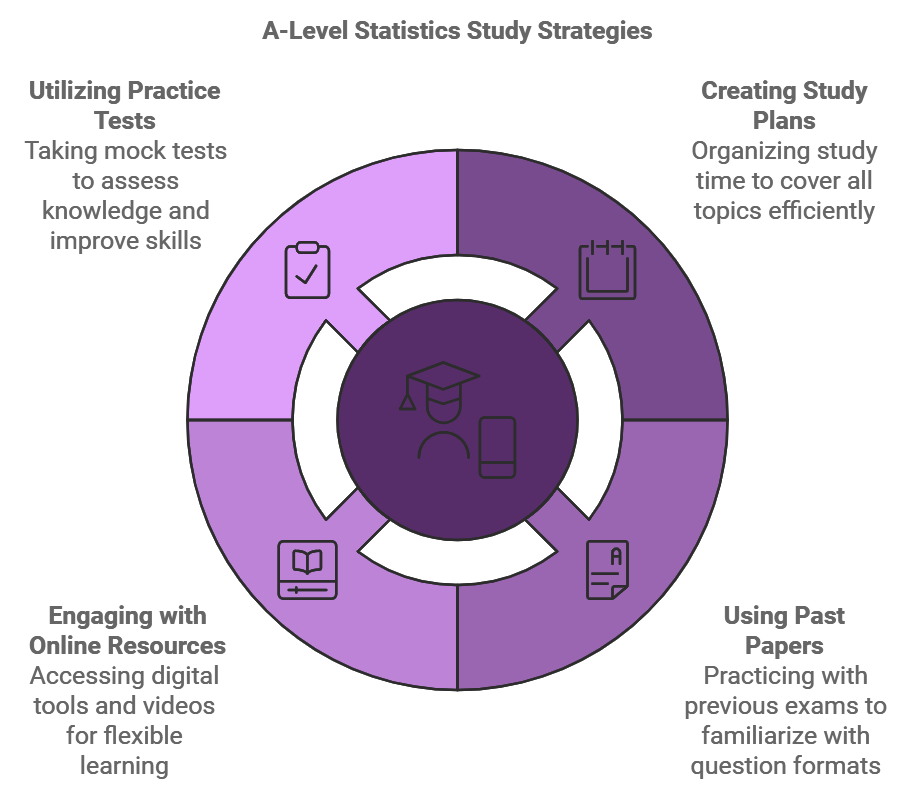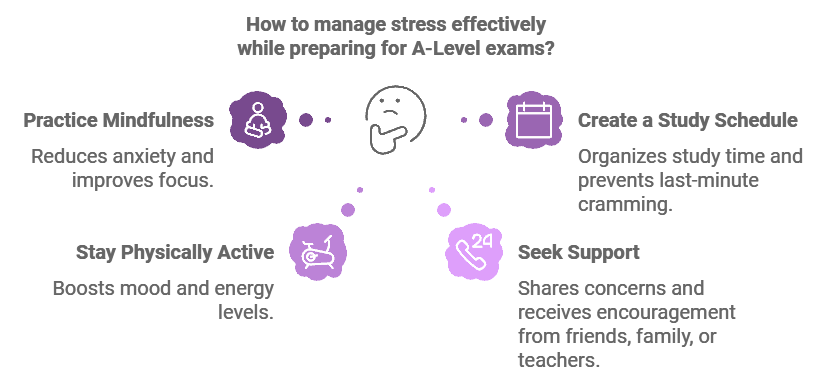A Level Statistics is a key component of advanced mathematics education. It offers students the opportunity to deepen their understanding of data analysis, probability, and statistical inference. This subject plays a significant role in the broader A Level curriculum, bridging mathematical theory with real-world applications.
Understanding A Level Statistics equips students with crucial analytical skills. These skills help in fields like economics, engineering, medicine, and social sciences. Statistical knowledge is essential in today’s data-driven world. Students who excel in this subject are often prepared for various academic disciplines.
Through A Level Statistics, students learn to interpret data, draw meaningful conclusions, and apply statistical methods to solve complex problems. This ability is highly valued in fields like business, healthcare, social research, and technology. That why A Level Statistics is a valuable subject for students aiming to pursue a wide array of career paths.

Overview of A Level Statistics Specifications
A Level Statistics is offered by several UK exam boards, including Edexcel, AQA, and OCR. Each board has its own guidelines and requirements. Understanding these differences is crucial for students, as the structure and content may vary slightly depending on the exam board.
Maths A Level Edexcel Specification
The Edexcel A Level Statistics specification focuses on data collection, analysis, and interpretation. It covers key topics like probability, correlation, hypothesis testing, and statistical distributions. This specification is well-regarded for its clear structure and emphasis on practical problem-solving, encouraging students to apply their knowledge in real-world contexts.
AQA A Level Statistics
The AQA A Level Statistics course has a strong emphasis on understanding the concepts of statistical inference and data interpretation. It includes topics such as probability, statistical hypothesis testing, and regression analysis. One of the stand out features of AQA’s approach is its comprehensive focus on both theoretical and applied statistics. Which gives students a well-rounded understanding of the subject.
OCR A Level Statistics
OCR’s A Level Statistics specification is known for its student-friendly approach, breaking down complex concepts into manageable sections. This specification covers a wide range of topics, including sampling techniques, data presentation, and probability distributions. OCR also includes the use of technology in data analysis, making it a good option for students who enjoy using software tools for statistical analysis.
While all three exam boards cover core statistical concepts, each has its own focus. Edexcel focuses on real-world applications, making it perfect for business or economics students. OCR, on the other hand, integrates technology, ideal for those keen on data analysis tools. Hence, students should choose an exam board based on their learning preferences and career aspirations to ensure the best preparation and exam performance.

Core Topics in A Level Statistics
A Level Statistics covers a range of fundamental topics that provide the foundation for statistical analysis and data interpretation. Here are the key areas of study:
- Probability: Understanding the likelihood of events happening. This includes concepts such as conditional probability, the binomial distribution, and probability trees.
- Data Analysis: Involves organizing, summarising, and interpreting data sets. Key methods include measures of central tendency (mean, median, mode) and measures of spread (range, variance, standard deviation).
- Hypothesis Testing: Learning to test assumptions or claims about a population using sample data. This includes significance levels, p-values, and interpreting test results.
- Statistical Distributions: Studying different types of distributions such as normal, binomial, and Poisson distributions, which are essential for making inferences about data.
Best Study Techniques For A Level Statistics
In fact, effective study techniques are crucial for mastering A Level Statistics. Given the complexity of topics like probability, hypothesis testing, and statistical distributions, it is essential to use strategies that enhance understanding and retention.
One of the most effective ways to study is through active revision. Engage with the material by solving past paper questions, focusing on A Level Statistics topics such as data analysis and probability. This approach helps reinforce theoretical knowledge through practical application. Additionally, creating mind maps can be highly beneficial. By visually organising statistical concepts, students can better connect ideas, particularly for complex topics like hypothesis testing and probability.
Regular practice with problems from past papers and example questions is another key strategy. This helps students familiarise themselves with the exam format and improve problem-solving speed. It’s particularly helpful for mastering complex areas like statistical distributions, where consistent practice is key to grasping the different analysis methods.
Additionally, using resources like the A Level Statistics formula booklet provided by exam boards can greatly support revision. Just as the A Level Maths formula sheet is important for core mathematics students, statistics students should become familiar with their specific formula references. Supplementing with textbooks and online tutorials further strengthens understanding. By applying these strategies, students can stay on top of A Level Statistics concepts, ensuring they are well-prepared and ready to achieve strong results in their exams.

The A Level Statistics Formula Booklet
The A Level Statistics Formula Booklet is an essential resource provided to students during their exams, offering a comprehensive list of key formulas and statistical methods. The formula booklet contains essential equations for topics like probability, statistical distributions, and hypothesis testing. Students can refer to these formulas during the exam, which helps in applying the correct statistical methods efficiently.
Using the formula booklet well can boost exam performance. Students should become familiar with the content beforehand, so they can easily locate the right formulas during the exam. Practising with the booklet while working through past papers will help students become quicker and more accurate during the test.
Besides formulas, the booklet may include reminders of key concepts, such as assumptions for specific statistical tests or calculation steps. Knowing when and how to apply these formulas in different contexts allows students to answer questions more accurately and maximise their scores.
Effective Revision Strategies for A-Level Statistics
So, effective revision and a structured approach can make all the difference in your exam performance. One of the most beneficial strategies is past paper practice. They provide insight into the format and types of questions you can expect in the exam, helping you become familiar with the structure and time constraints. Working through past papers, such as:
Edexcel A Level Statistics Past Papers
AQA A Level Statistics Past Papers
OCR A Level Statistics Past Papers
allows students to pinpoint areas where they may be struggling.By revising regularly with past papers, students can track progress and improve their understanding of statistical methods, like probability and hypothesis testing.
Another useful tip is using A Level Statistics revision materials tailored to each exam board’s specification, along with GCSE statistics past papers. These resources focus on the specific requirements of your exam board, ensuring your revision aligns with the test content. Reinforcing key topics from AQA or Edexcel A Level Statistics, along with practicing GCSE Statistics questions, will better prepare you for the exam.
Incorporating active techniques, such as summarizing notes or teaching others, along with past paper practice, will boost recall and reinforce knowledge. Consistent revision, practising under timed conditions, and analysing exam questions will help you build confidence and competence for your A Level Statistics exam.

Conclusion
In summary, Statistics is a vital component of mathematics education, equipping students with crucial skills in data analysis, probability, and statistical reasoning. A solid grasp of these concepts is not only important for academic success but also opens doors to various career paths in fields like economics, social sciences, and business.
Consistent study, regular practice, and a strategic approach to revision are key to mastering A Level Statistics. Make use of the resources available, such as the A Level Statistics formula booklet, past papers, and revision strategies, to enhance your preparation.
If you need extra support, consider seeking help from online A Level Statistics tutors. With personalized guidance, you can tackle challenging topics and approach your exams with confidence.
Remember, dedication and the right approach can make all the difference. Start working with a tutor today and unlock your full potential in A Level Statistics!
FAQs:
What is A Level Statistics about?
A Level Statistics is focused on understanding and applying statistical methods to analyse data. It covers topics such as probability, hypothesis testing, data analysis, and statistical distributions. The subject is designed to teach students how to handle real-world data and use statistical tools in various fields like business, economics, social sciences, and natural sciences.
What are the topics for A Level Statistics?
The main topics covered in A Level Statistics include probability, data handling, statistical distributions, hypothesis testing, correlation, regression, and statistical inference. These topics form the foundation for statistical analysis and will help you tackle real-world data problems
How to pass A Level in Statistics?
To pass A Level Statistics, students should focus on consistent revision and practice. Understanding the key concepts, using the A Level Statistics formula booklet effectively, and practicing with past papers are essential. Seek clarification on any difficult topics, work through problem sets regularly, and review your errors to avoid repeating them in exams.
How to get an A in A Level Statistics?
To get an A in A Level Statistics, students must master key concepts, practice consistently, and understand the theory behind the statistical techniques. Use resources such as past papers from exam boards like AQA, Edexcel, or OCR, attend revision sessions, and work with tutors if needed. Ensure you focus on both understanding the formulas and being able to apply them in real exam scenarios. Regular revision and active problem-solving will go a long way in securing top marks.








